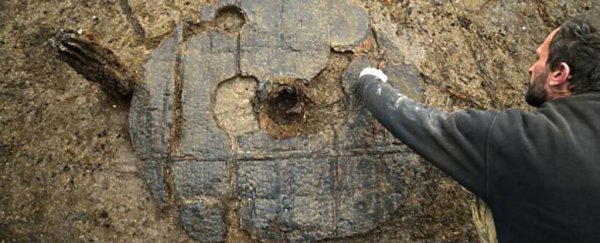The wheel holds a lofty place in human history. Though we rarely give them a second thought today, imagine how much easier day-to-day life became once that simple device was invented - there's a reason that something so old is still around in basically the same form today. Now, researchers in the UK claim to have found one of the most complete wheels from the Bronze Age, and it's been perfectly preserved in silt for the past 3,000 years.
Archaeologists from the University of Cambridge uncovered the wheel at Must Farm, a Bronze Age dig site in England that's often referred to as 'Peterborough's Pompeii'. Must Farm was once the location of a small town that jutted out over a river - that is, until a fire broke out and caused most of its wooden structures to sink into the nearby water and silt, preserving them for over three millennia. In a way, the ancient city is just like a natural, muddy time capsule.
The newly found wooden wheel dates back to between 1100-800 BC, and is about 1 metre in diameter. If those dates are correct, it means the wheel is one of the oldest ever found in Britain.
"This remarkable but fragile wooden wheel is the earliest complete example ever found in Britain," said Duncan Wilson, chief executive of UK-based research organisation, Historic England. "The existence of this wheel expands our understanding of Late Bronze Age technology and the level of sophistication of the lives of people living on the edge of the Fens 3,000 years ago."
To make the find even more incredible, its existence is challenging our assumptions on the technology available to the masses in the Late Bronze Age. And the team believes the wheel is proof that the ancient, river-based town had a connection to other cities and towns on dry land. Understanding these trade routes and partnerships will help us understand how Bronze Age civilisations operated with one another.
The new wheel is just one of countless other artefacts that researchers have pulled from the muddy remains at Must Farm. As Kasia Gdaniec, Senior Archaeologist for Cambridgeshire County Council, puts it:
"Among the wealth of other fabulous artefacts and the new structural remains of round houses built over this river channel, this site continues to amaze and astonish us with its insight into prehistoric life, the latest being the discovery of this wooden wheel.
Believed to be the most complete example yet found from this period, this wheel poses a challenge to our understanding of both Late Bronze Age technological skill and, together with the eight boats recovered from the same river in 2011, transportation."
In Europe, the oldest wheel ever discovered was dated to around 2500 BC during the Copper Age, reports the team. For Britain, the oldest wheel on record - dubbed the Flag Fen wheel - dates to 1300 BC, so about 200 years older than the newly found artefact. But the new wheel is bigger and more complete than its slightly older 'brother'.
Hopefully, as the dig continues, more artefacts will surface to give us a complete picture of Late Bronze Age life.
